ESO proposes retrospective application of upcoming long-term connections reforms

The Electricity System Operator (ESO) recently announced its proposal to extend long-term connections reform to the existing queue of renewable energy projects looking to connect to the national transmission network.
The announcement comes after calls for more radical reform to address the increasing growth of a queue that currently stands at over 700GW. Yesterday, Scottish Renewables attended ESO’s Connections seminar in Glasgow to hear more about the evolving reforms.
In December 2023, ESO published its Connections Reform recommendations, which included the introduction of a Two-Gate process through which projects would be more rigorously assessed for connection readiness. The model, known as Target Model Option 4 (TMO4), would require new queue applications to present evidence of land rights to progress past Gate One, with the ‘readiest’ projects being filtered towards connection at Gate Two. The process aimed to remove stalled projects from the queue and reward those that were closest to supporting the UK’s decarbonisation targets.
The newly announced approach, Target Model Option 4+ (TMO4+), is proposing to apply the Two-Gate process to the entirety of the existing queue as well as all new applicants, with offers only being made for those meeting Gate Two criteria. Similarly, only at Gate Two would projects be subject to specific milestones, user commitment liabilities or supporting transmission reinforcement. Prior to the eventual implementation of TMO4+ (scheduled for January 2025), projects sitting within the existing queue would be afforded a period of time to evidence their Gate Two readiness.
The ESO is expected to undertake a thorough impact assessment of various approaches for determining Gate Two criteria in order to mitigate any unintended consequences and build confidence around the proposed benefits. Once a preferred approach is identified, the ESO will seek industry stakeholder views over the summer after which it will approach the national energy regulator, Ofgem, to enact the necessary code modifications ahead of the January implementation date.
Initial estimates forecast that the proposal will more than halve the size of the existing queue, which is expected to surpass 800GW by the end of the year.
TMO4+ is the latest, and undeniably most significant, proposal to be brought forward by the ESO ahead of its continuing reform. At the end of last year, Ofgem approved an amendment aimed at de-congesting the queue that introduced a ‘Queue Management’ process whereby projects would need to demonstrate progress at various ‘User Progression Milestones’. In late March of this year, the ESO introduced a specific milestone that demanded all new transmission connection applicants submit a Letter of Authority (LoA) evidencing secured land rights with their connection submission.
The milestones are intended to demonstrate a developer’s commitment to a project; however, their impact is limited by the pace of the incoming queue. Thus, the need for more radical reform. Scottish Renewables is fully engaged in the process of connections reform and will continue to look for the most suitable solution to meet our national, net-zero goals. We will look to work alongside the ESO and engage with our members to best represent industry in the upcoming consultation.
For a deeper dive into the evolution of the connections reform landscape over the last year, see our Connections Reform Explainer.
Holly Thomas, Policy Manager for Grid and Systems at Scottish Renewables said:
“One of the key barriers net-zero faces is the time it can take for renewable energy generation projects to connect to the electricity network. Immediate actions to relieve the overburdened connections queue are being outpaced and weakened by the unprecedented pace of new entrants.
“However, it is essential that decisions on moving or removing projects with agreements to connect to the electricity network are made with the best evidence available to avoid unintended consequences.
“Industry is calling for clarity around the connections reform and an enduring solution to the issue of delayed connection dates.
“Scottish Renewables will continue to work closely with the ESO and our members when consultation on theretrospective reform takes place to find an effective solution that supports legitimate projects and provides certainty for investment.”